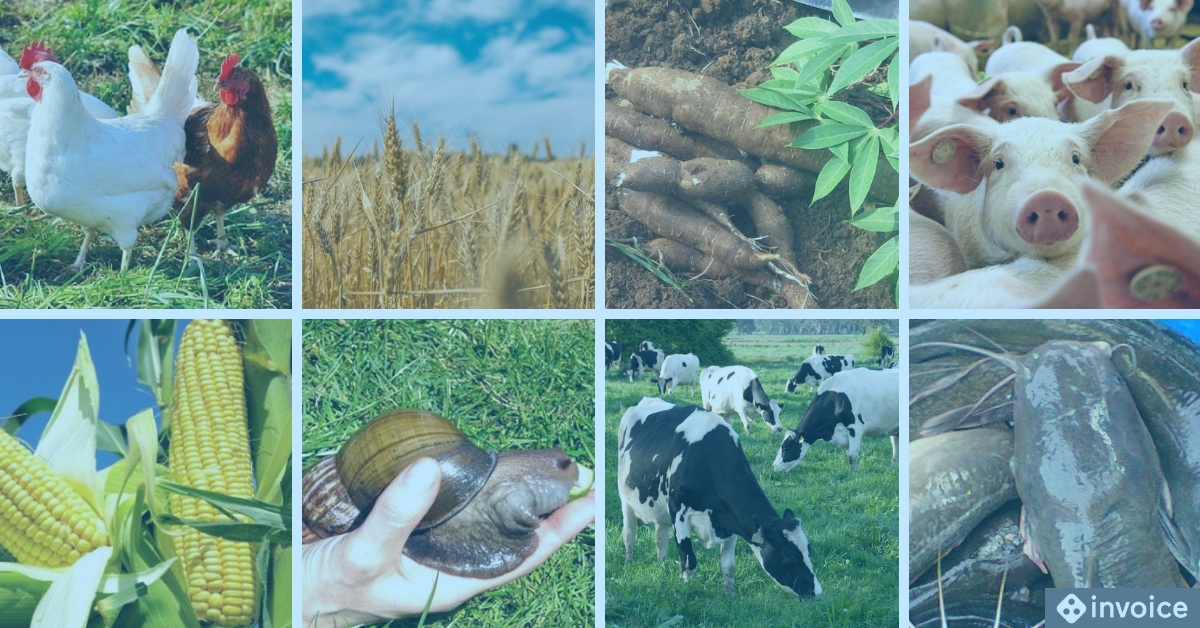What are the best agricultural business ideas to start in Nigeria in 2023? The Agricultural sector contributes just a little over 20% to the overall GDP of the country, even though it can be much more.
The agricultural sector is one of the most flourishing sectors of the Nigerian economy. With proper strategic planning, anyone with basic knowledge of farming and manufacturing operations can start a profitable agriculture business.
You don’t need a huge capital or farmland to enter the agriculture business. If you have a little piece of land in your backyard, you can still plant some crops in small or vertical containers to get the most out of your space.
In this post, we shared a list of the most lucrative agricultural and farming business ideas anyone in Nigeria can start in 2023.
1. Cassava Farming.
With the increasingly diverse use of cassava products in Nigeria, cassava farming is getting more lucrative daily. This farm product has always been a source of lively hood and food for millions of Nigerians. 90% of Nigerian households consume cassava products every day. Some popular meals made out of cassava are garri, wheat flour, animal feed, commercial caramel, and a lot more.
As the population of Nigeria and Africa as a whole continues to grow, the demand for cassava products will continue to skyrocket, leading to higher revenues generated by cassava farmers. If you’re looking for an agricultural business that ensures you always almost sell out all your harvests, cassava farming is one great business to start.
2. Poultry Farming.
Poultry farming is the process of raising domesticated birds such as chickens, ducks, turkeys, and geese to farm meat or eggs for food. Poultry Farming in Nigeria is probably one of the most lucrative farming businesses you can do. The quick maturity of chicken presents one of the finest opportunities for entrepreneurs to make good money within the shortest period of time possible.
With over 160 Million consumers in Nigeria alone, the market is always there, waiting to be tapped. The demand for poultry products such as eggs is so high that people go about every day looking for where to get the supplies needed.
3. Rice Farming.
Nigeria is the largest producer of rice in West Africa and the third in Africa after Egypt and Madagascar producing about 3.6 million metric tons on average annually. Interestingly, Nigeria still falls short of meeting its local demand, which is about 5.5 million tons.
Because Nigeria has a vast market for rice, if you are looking for a lucrative agricultural business idea in Nigeria, you need to seriously consider entering the rice farming business, which is undoubtedly one of the most profitable businesses in the Nigerian agricultural sector.
4. Snail Farming.
Snail farming is considered one of the most lucrative agribusinesses you can start with low capital in Nigeria today. Yet, it is one of the most neglected animal-rearing businesses in the country. Snail farming in Nigeria provides one of the finest opportunities to make money within a short period of time.
Snail farming is a niche and unusual business type of business. It’s very expensive to buy snails to eat because snails are very dormant during the dry season, they become increasingly scarce during this period, and the market is starved of adequate supply until the next wet season.
Also Read: Top Five (5) Challenges Of Doing Business In Nigeria.
5. Catfish Farming.
Many kinds of fish are growing in Nigeria; however, many people like catfish because its meat is juicy, soft, and tasty. However, not everyone knows that this fish can be grown quickly; even on a small farm, you can organize catfish farming at home.
There’s a very high demand for catfishes all year round. The demand is highest from football viewing centers, restaurants, and market women who buy in bulk and sell in retail as live catfish or smoked catfish. Individuals also demand catfish too for personal consumption. With catfish farming, you’ll never have any problem selling your products.
6. Maize Farming.
The Maize farming business has definitely been thriving in Nigeria for decades. Maize, also known as corn, is one of Africa’s most popular food crops. Maize is cooked in various ways, and millions of Nigerians rely on this crop because it usually costs less than wheat, rice, and other common grains and cereals.
The importance of Maize production in Nigeria cannot be overemphasized. A lot of by-products are obtained from Maize. Maize production gives birth to many other consumables, including Pap, Custard, Corn Oil, Alcohol, Cornflake, Animal/Livestock Feeds, Corn Flour, Corn Starch, and Corn Powder.
7. Pig Farming.
Pig farming in Nigeria is one of the most lucrative and profitable livestock businesses. Commercial pig farming is beneficial because pigs are prolific breeders and can deliver 10 to 14 piglets in a single birth.
Pig meat (pork) has an excellent demand since red meat is a good source of protein and is tasty. The pork market in West Africa alone accounts for about $3 billion in consumption value. 80% of that is sourced by importation. That is a lot of untapped revenue.
8. Honey Bee Farming.
Honey bees can produce lots of honey, and selling honey can be a lucrative business for people who aren’t allergic to bee stings, who don’t have a lot of money, and who have little space in their backyard to farm their honey bees.
Honey is one of the oldest sweeteners on earth. Lucky for us, it also has many health benefits and uses. Keeping bees at a large scale for commercial purposes as a business plan is increasing in this fast-growing world.
Conclusion.
There’s a surge of interest in the Agricultural sector in Nigeria. Many entrepreneurs are taking on various areas of agriculture, disrupting and transforming them into viably successful endeavors using information technology.
From maize farming and rice production to poultry farming and fishery. Farming is starting to recover its age-old respectable reputation.

